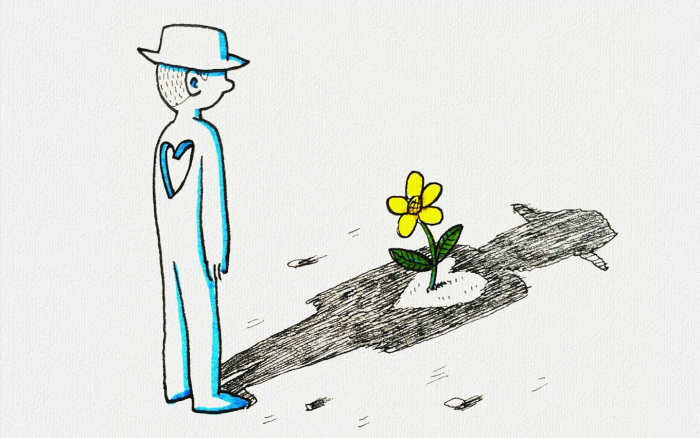“How are you?”
I sincerely hope you’re okay. But if you’re not, I pray that you find the spark—rekindle your spirit and positive energy—to reclaim your smile.
It’s been such a challenge keeping up with the people in our lives, largely due to the pandemic that continues to overwhelm us. Cracks have been exposed as a consequence.
Add another layer of tyrannical politics, unending lockdowns and restrictions, anxiety-breeding trends on social media, and you have the perfect sh*t sandwich, which we’ve all devoured in the last 12 months.
People are busy in their little boats, paddling through the pain in their chests (and shoes!) as secret tears roll down their cheeks.
Paddle, we must—else, we sink.
Many are gradually losing faith and vigor, sickened by the vastness of the ocean before them—an unending sea of challenges, hopelessness, and a dwindling appetite for life.
So, one by one, we’ve drifted away from each other—farther and farther, deeper and deeper into the unknown.
No matter the age, gender, or location, this sh*t sandwich remains ubiquitous, poisoning and crippling our mental health, finances, and relationships.
Could this be the reason we have become uptight and distant—reluctant to say, “Hi” or ask an old friend, neighbor, or family member, “How are you?”
Personally, I think the abovementioned three-word question is an opportunity for release.
It’s a gift—attention we can offer to people who are perhaps longing for a platform to exhale.
But everyone seems to be dealing with something; we’re fixated on an exhausting yet inexhaustible treadmill—chasing wild thoughts and dodgy desires.
Hooked on this strange new frequency, it is no surprise that the collective human spirit is scrambling—desperately fine-tuning the vibe which has been distorted by uncertainty and chaos.
This sudden attack on our way of life and source of income has been invasive, disabling, and overwhelming.
Some have reacted swiftly to the unnatural transitioning of dawn to dusk, while others remain mummified, frozen by the cold realization that our lives and the people in it may never be the same.
For years we prayed, saved, partied, and socialized—stocking our spiritual and psychological reservoirs with faith and fun—hoping that our investments would yield sufficient cover when the sun disappears and life turns grey.
Well, the storm has arrived. And, like a thief in the night, it stole the salt from our tears, leaving us tender, hollow, vulnerable, and light.
Many have lost a lifetime of savings and support; others have lost people and jobs.
Like scavengers, we roam—searching for answers and desperate for meaning.
Cradling colorful memories of a life once lived, we ponder:
Where can I find the hope and strength needed to fill a gully that’s so wide, so deep, so dark—eroded with desperation, misery, and pain?
How do we mend our broken hearts and heal our sick land?
What will compensate for the destruction and losses suffered?
At worst, many have launched a precipitous multileveled salvage mission.
At best, others have embarked on a mind-body reconstruction project, locked away from everyone and everything until further notice.
People are searching for whatever they’ve lost (or the idea of it) in places they, perhaps, never imagined they’d look, leveraging endorphin kickers to extinguish mental flames as they toil in the shadows.
Could this be the reason we’re walking around with short fuses, snapping at anyone who gets too close, or questioning the intent of every wave and hello?
Who knows?
With the sh*t sandwich stuck in our throats, everyone is undergoing reconfiguration within the confines of four very high imaginary walls. We’re learning to live in the new normal, like children exploring the peddling fundamentals of a bicycle.
However, the higher the walls, the lower the chances of kindness being shown in the real world. These are testing conditions.
If life was, more or less, “promising” pre-COVID-19, it has taken a Masterclass and plummeted deeper into dangerous depths.
Many are struggling with the terms and conditions of the new normal, filled with varying degrees of wild emotions that could suffocate a fragile soul.
We all know it. We all feel it. We all see it.
But whose ears are waxed, purged to grasp tales of discontent and agony?
Whose shoulders are steady, readied for another on the verge of collapse to lean on?
Who wants to reach out and check up on friends, family, neighbors, and even strangers?
Who is ready to put themselves in another’s worn-out shoes?
It’s a sacrificial disposition that requires a rare, critical skill: empathy.
Empathy is the ability to understand and share the feelings of another. It doesn’t ask or expect anything in return.
It shows up and stands in the gap, humble and present, unashamed to travel side by side across the bumpy roads and thorny fields.
Empathy isn’t perfect, beautified, or glorified; it comes wearing a bruised badge of compassion, asking, with love and care, “How are you?”












Read 37 comments and reply